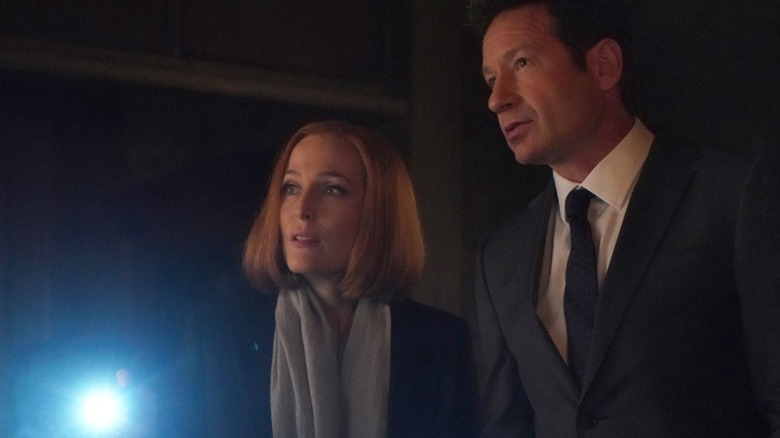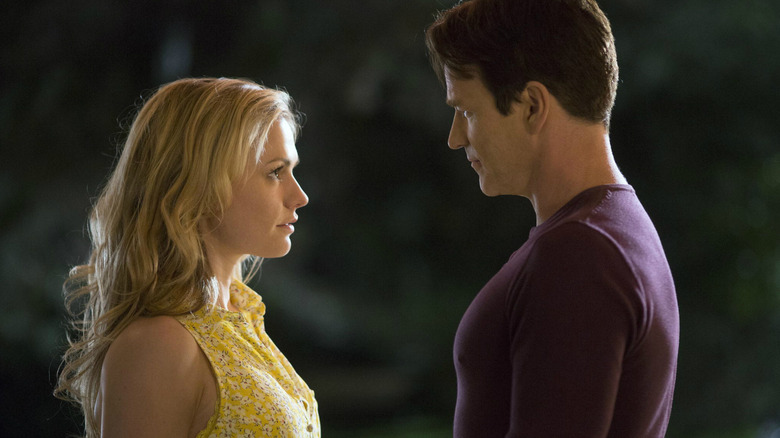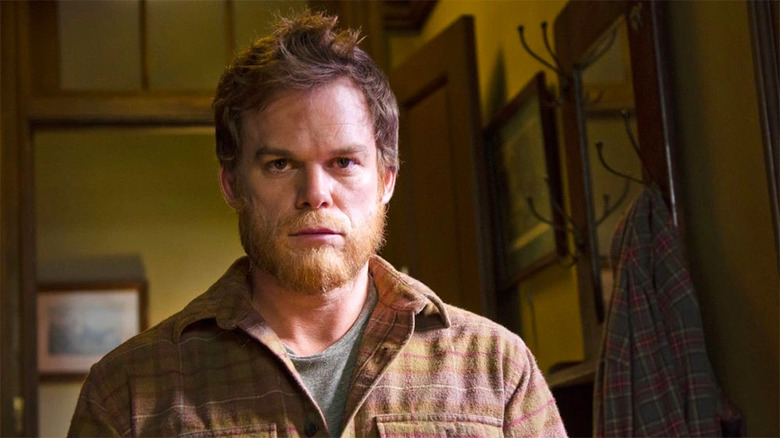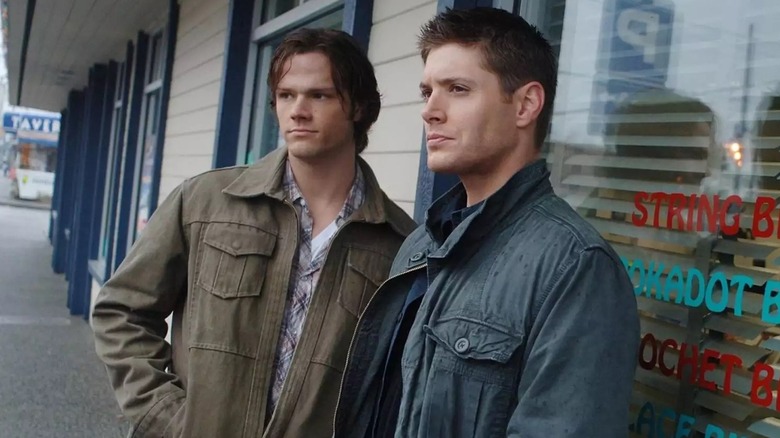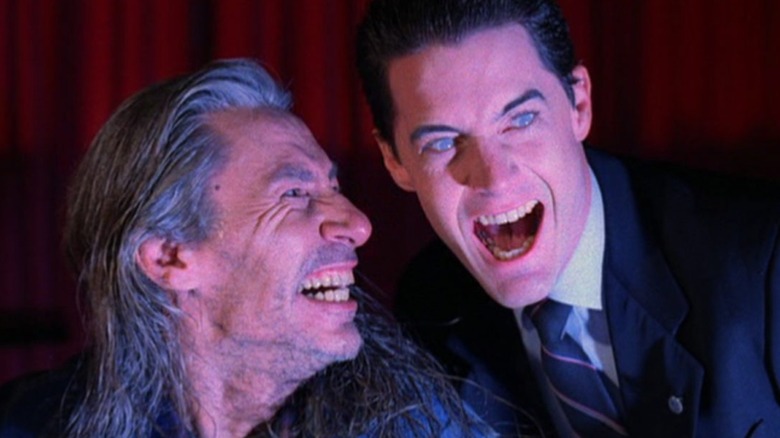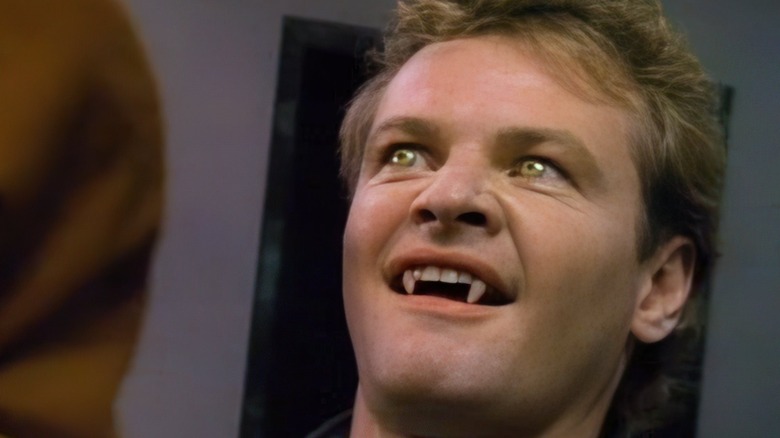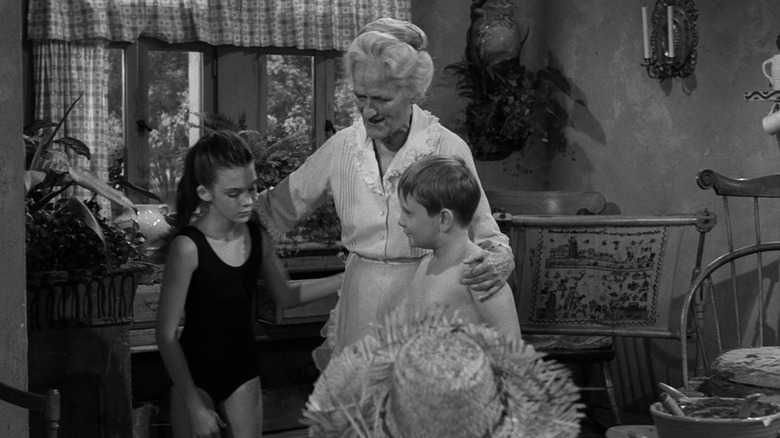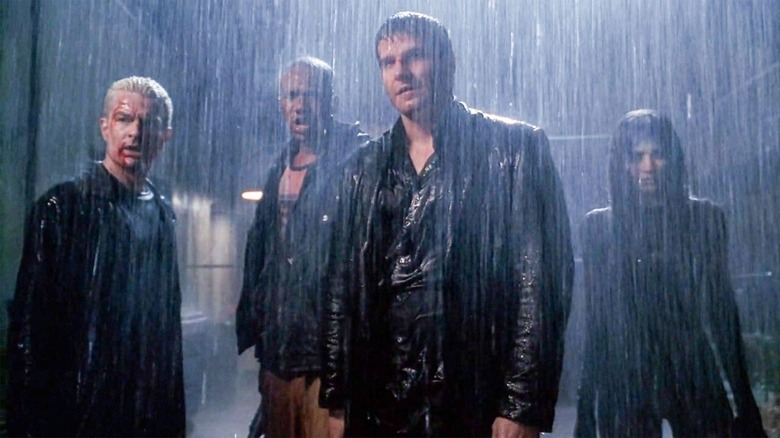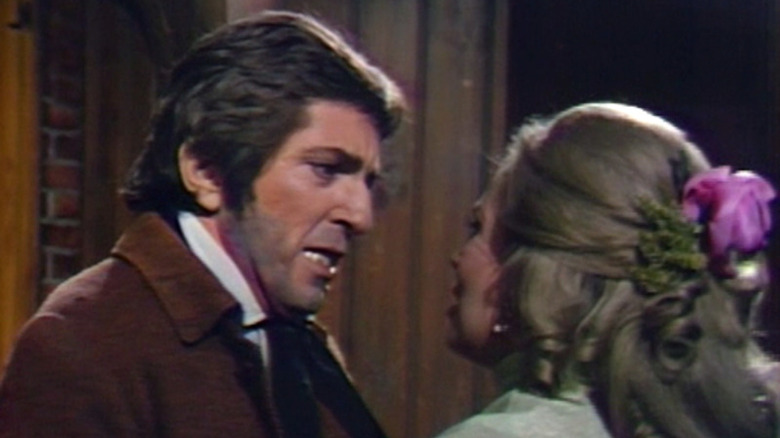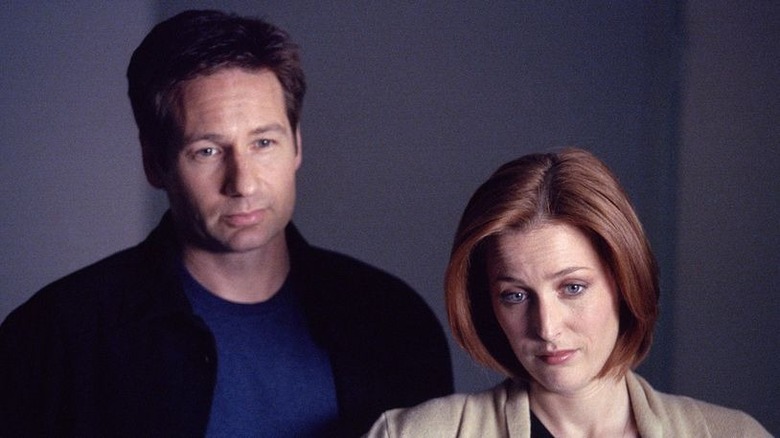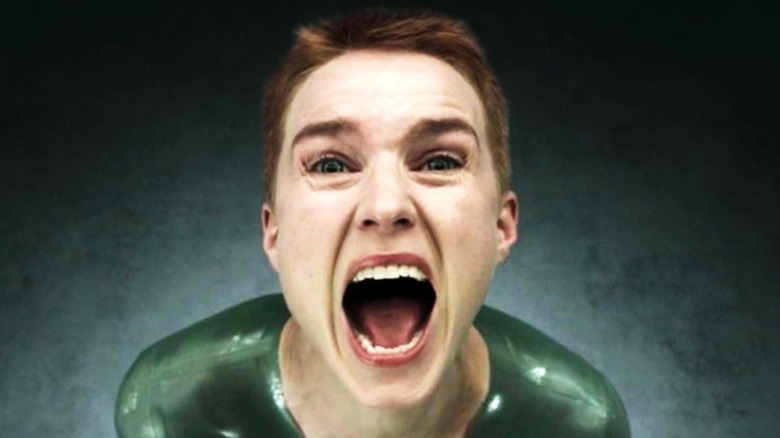Terrible Endings That Ruined Horror TV Masterpieces
Regardless of genre, fans place an enormous amount of expectation on series finales. It's not easy to carry the responsibility of wrapping up any extraneous plot threads and character arcs in a satisfying way for longtime audiences. Even the most acclaimed shows, like "Seinfeld" and "The Sopranos," can have their entire successful run overshadowed by middling or divisive reception to their respective finales. This distinction carries over to horror TV shows, with plenty of notable series marring their celebrated legacies because of the last impressions left by divisive final episodes.
Horror shows often suffer from abrupt cancellations, denying audiences a satisfying amount of closure thanks to anticlimactic endings that don't live up to fan expectations. Even some of the most enduring and iconic horror shows have come to a close with lackluster finales. Here are the most maligned endings that ruined the legacies of TV horror classics by failing to stick the landing.
True Blood
Based on the novel series "The Southern Vampire Mysteries" by author Charlaine Harris, HBO's "True Blood" was a major success, running for seven seasons. The show features a world where vampires exist publicly with the help of a synthetic blood, which inspires other supernatural creatures to emerge. In the middle of the paranormal action is Sookie Stackhouse (Anna Paquin), a telepathic server caught in a bad romance with vampires Bill Compton (Stephen Moyer) and Eric Northman (Alexander Skarsgård). In the final season, vampires are ravaged by a worldwide virus while Eric confronts the source of the synthetic blood, the Yakanomo Corporation.
In the series finale, Sookie helps an infected Bill stake himself after Eric dismantles the corporation. The story flashes-forward four years, with Eric heading a company that provides a new synthetic blood which cures the deadly virus. Sookie is married to a new, unnamed character and pregnant with their child, while her brother Jason (Ryan Kwanten) has married Brigette (Ashley Hinshaw). For a show that had so long embraced its campy premise, "True Blood" ends on a bland note that forgets to have fun. The final injustice is, after waiting seasons to see who Sookie ends up with, seeing her with no established character at all. "True Blood" ends on a misdirect, which is always vaguely insulting to viewers so invested in the characters and their relationships.
Lucifer
"Lucifer" possessed a fervent fan base that saved it from cancellation on Fox, with the show moving to Netflix for its final three seasons. The Prince of Darkness (Tom Ellis) grows tired of reigning in Hell and relocates to Los Angeles, assisting the local police department as a consultant. As Lucifer connects with humanity, he strikes up a romance with police detective Chloe Decker (Lauren German). Lucifer's presence on Earth leads to heightened supernatural activity, with the fallen angel taking on divine enemies menacing him and his colleagues.
After confronting the forces of Heaven and Hell across the series, the final antagonist is Vincent Le Mec (Rob Benedict), a French mobster. What the "Lucifer" finale lacks is that grand sense of scale that the series felt it was building towards for several seasons. This baffling choice in a closing adversary is followed up with Lucifer choosing to return to Hell rather than remain on Earth with Chloe and their daughter Rory (Brianna Hildebrand). Though Lucifer is changed by his time on Earth, the show feels a bit too full-circle with its narrative.
Dexter
For eight seasons, audiences watched serial killer with a heart of gold Dexter Morgan (Michael C. Hall) prey on the violent criminals of Miami. A genius forensic technician, Dexter channels his secret bloodlust to target those who have escaped punishment from the legal system. This lethal side hustle as Miami's most murderous vigilante pits Dexter against other devious killers, often resulting in deadly games of cat-and-mouse between them. In the midst of dispatching these bloodthirsty criminals, Dexter hides his violent double life from his family and coworkers in the Miami Police Department.
The final season of "Dexter" offers a lurid, uneven story, particularly for Dexter's adopted sister Debra Morgan (Jennifer Carpenter) and the way she handles learning her brother's secret. Debra's questionable plot trajectory ends with Dexter euthanizing her in a hospital after she becomes brain dead from a surprise stroke. As his personal life crumbles, Dexter fakes his death but resurfaces working in Oregon as a lumberjack under an assumed name. The ludicrous way for Dexter to escape the consequences of his actions and abandon his young son split fans, who widely derided the finale. Eight years later, the revival series "Dexter: New Blood" rectified this reviled ending by giving Dexter a far more fitting and definitive send-off.
Supernatural
The CW's longest-running original scripted series "Supernatural" finally came to an end with its 15th season in 2020. The show centers on Sam and Dean Winchester (Jared Padalecki and Jensen Ackles), two brothers who battle all kinds of monsters that threaten to overtake the world. Across the series' lengthy run, the Winchesters take on everything from Lucifer (Mark Pellegrino) to the Four Horsemen of the Apocalypse, preventing literal Armageddon. The final season ups the ante by pitting the Winchesters against a vengeful God (Rob Benedict) who is prepared to eradicate all life on the planet.
After defeating God in the series' penultimate episode, the Winchesters look forward to creating their own future free of divine manipulation. After this epic showdown, the series finale focuses on an anticlimactic fight against a vampire coven, with Dean killed in an off-hand manner for good. In a flash-forward Sam reunites with his brother in the afterlife after passing away from natural causes. For a show that killed and resurrected its leads on multiple occasions with its heavenly stakes, Dean's forced permanent death to such a low-level issue makes the "Supernatural" series finale to such a long-running show feel like an afterthought.
Twin Peaks
Premiering in 1990, "Twin Peaks" grew into a surprise success, embracing the narrative eccentricities crafted by creators Mark Frost and David Lynch. FBI Agent Dale Cooper (Kyle MacLachlan) investigates the eponymous Pacific Northwestern small town after local homecoming queen Laura Palmer (Sheryl Lee) is murdered. Dale descends deeper into the supernatural elements influencing the town, including the malevolent entity known as Killer BOB (Frank Silva). The finale to the second and final season (at least for a very long time) ends on a major cliffhanger, with Killer BOB possessing Dale as he laughs maniacally.
Lynch left "Twin Peaks" early into production on its second season, with the season seeing a noticeable loss of direction shortly thereafter. After solving Laura's murder midway through the season (something Lynch and Frost didn't want to do), the overarching story grew meandering and bizarre, culminating in its abrupt finale. Lynch publicly disowned the second season of "Twin Peaks" and, like many fans, was thoroughly dissatisfied with the ending. To give the story a proper sense of closure, Lynch returned to "Twin Peaks" for a revival series on Showtime in 2017, 26 years after the original series finale.
Forever Knight
The Canadian television series "Forever Knight" is a true cult classic, having run for three seasons from 1992-1996. Nick Knight (Geraint Wyn Davies) is an 800-year-old vampire working as a night shift police detective in 20th century Toronto, concealing his undead state from his colleagues. Nick is driven by his thirst for redemption after centuries of preying on humans, now maintaining a strict diet of animal blood. Nick searches for a way to regain his humanity, but this is complicated by the arrival of two old vampiric acquaintances, Lucien LaCroix (Nigel Bennett) and Janette DuCharme (Deborah Duchêne).
In the series finale, Nick is offered the chance to become human if he sacrifices his friend Natalie (Catherine Disher). Instead, Nick hands Lucien a wooden stake, with the next scene abruptly cutting to Nick standing in the open sunlight. There is no explanation if Nick indeed restored his humanity or was killed by Lucien and progressed to the afterlife. This unresolved plot thread frustrated viewers hoping for some degree of closure rather than an off-screen confrontation with no clear resolution.
The Twilight Zone
In an era when wholesome sitcoms like "Leave It to Beaver" were ruling the airwaves, "The Twilight Zone" made its mark as the medium's early foray into the dark and twisted. Created by Rod Serling, the original iteration of the anthology series ran for five seasons from 1959-1964, with each episode covering a standalone story. From whimsical fantasies to intense, horror-driven tales that embraced the macabre, "The Twilight Zone" was an early pioneer of genre television. The final season saw a change in producers behind-the-scenes that noticeably affected its quality, including with the show's series finale.
The last episode of "The Twilight Zone" to air was "The Bewitchin' Pool," a fantasy about children who are able to escape from unhappy homes through a magical swimming pool. Running heavy on schmaltz, with a flimsy premise and uneven pace, the episode is among the worst in the series. The last episode technically produced for the series is "An Occurrence at Owl Creek Bridge," which aired four months earlier. The episode comes from a heavily edited French short film, repurposed to fit the show's format and bought for a significantly lower price than standard production costs for an episode. Both episodes fail to give "The Twilight Zone" a sendoff befitting a groundbreaking series.
Angel
The '90s television series "Buffy the Vampire Slayer," itself inspired by a 1992 film of the same name, became a cult favorite that expanded into a whole franchise encompassing comic books and video games. Buffy's (Sarah Michelle Gellar) initial love interest, the tortured vampire Angel (David Boreanaz), received his own spin-off series, simply titled "Angel," which ran for five seasons from 1999-2004. The series covers Angel continuing his quest for redemption from all the evil he committed as a vampire, defending Los Angeles from the armies of Hell. The "Angel" series finale revolves around a confrontation with an insidious cult, the Circle of the Black Thorn, who plan to unleash Hell on Earth.
Angel's group of allies endure betrayal and murder ahead of the final battle, including the death of fan-favorite characters Wesley Wyndam-Pryce (Alexis Denisof) and Lindsey McDonald (Christian Kane). However, the big battle that Angel and his friends are preparing for is never actually seen, with the show ending as the heroes charge into the fray.
The showrunners defend the finale to this day, explaining the lack of payoff suggests that the fight is truly never-ending for Angel, but this feels like a cop-out. The low-key killing of Lindsey by one of Angel's associates rather than Angel himself, after years of shared antagonism, is a real letdown.
Dark Shadows
The popular daytime soap opera "Dark Shadows" started out as a Gothic romance that quickly veered into supernatural horror with the introduction of ghosts, vampires, and werewolves. The paranormal hijinks escalate when vampire Barnabas Collins is freed from his coffin, with actor Jonathan Frid quickly becoming the star of the show. "Dark Shadows" aired from 1966-1971 and spawned an entire wave of merchandising, not to mention three theatrical features. Though Barnabas eventually overcomes his vampirism and receives a happy ending, "Dark Shadows" aired for an additional 48 episodes, ending the series with a decided whimper.
Frid grew tired of playing Barnabas and, fearing typecasting, declined to continue the undead role in early 1971. This complicated not only plans for a sequel to 1970's movie "House of Dark Shadows," but also the future for the television series, which was still very much on the air. For its final months, the narrative took a detour to an alternate timeline version of the Collins family in 1841. Though the supernatural elements remain, they're considerably downplayed, with the story leaning more into romantic intrigue. "Dark Shadows" was canceled in April 1971, with a narrator providing closure to the outstanding plot lines in the rushed series finale.
The X-Files
"The X-Files" has the dubious distinction of providing two separate entries to the canon of terrible series finales, but we'll consolidate it to one. This is a shame, because "The X-Files" was an early success for Fox and inherited the crown from "Twin Peaks" for network horror television. For a franchise that defined an era and spawned two feature films and two spin-off shows, "The X-Files" whiffed with the finale of its original run. And though the revival series initially started out with promise, reuniting FBI agents Scully (Gillian Anderson) and Mulder (David Duchovny) to investigate paranormal conspiracies, it fell apart with its final season.
The ninth and final season of "The X-Files" original run placed Fox Mulder on trial for exposing a government conspiracy involving a prophesied alien invasion. Spending too much time with its courtroom drama centerpiece and the forced return of the villainous Cigarette Smoking Man (William B. Davis), the finale feels incomplete.
The revival series ends on a worse note, killing both the Cigarette Smoking Man and former protagonist Monica Reyes (Annabeth Gish) in an off-handed anticlimactic way. More bizarre, Scully explains to Mulder that their son William (Miles Robbins) was actually an implant, while announcing she is pregnant with her and Mulder's first true baby. This undercuts years of in-show mythology for a fake-out with no current plans for a proper resolution.
Raised by Wolves
The HBO Max original series "Raised by Wolves" was backed by celebrated filmmaker Ridley Scott, who directed the first two episodes and executive produced the project. However, even this high level of Hollywood prestige couldn't save the show, which was canceled after two seasons in 2022. The cancellation came as a result of corporate restructuring, with WarnerMedia transforming into Warner Bros. Discovery earlier that year. This change in content strategy caused "Raised by Wolves" to end with a series finale that asked questions ultimately never to be answered.
"Raised by Wolves" blends horror and science fiction into a tale of androids developing a human colony on a remote exoplanet after Earth's destruction. The series finale reveals the android Grandmother (Selina Jones) intends to revert humanity into a fish-like aquatic race. Meanwhile, the human protagonist Marcus (Travis Fimmel) is incapacitated and crucified by the villainous Lucius (Matias Varela). This unresolved cliffhanger, along with the nature of the show's cancellation, understandably incensed "Raised by Wolves" audiences.
